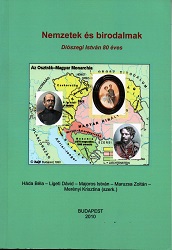
We kindly inform you that, as long as the subject affiliation of our 300.000+ articles is in progress, you might get unsufficient or no results on your third level or second level search. In this case, please broaden your search criteria.

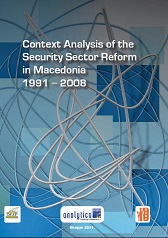
This paper looks at the general political and security sector context in the last two decades since Macedonian independence, and traces the major trends and events that shaped the political developments and progress with security sector reforms in post-communist Macedonia. For the purpose of this paper, the analysis of the post-communist transition period is divided in three parts, corresponding to the three periods on which we divided the context since 1991, for the sake of greater clarity and analytical coherence. For each of these three periods, we conducted an analysis of major political developments as well as institutional change. Based on this analysis, each period is qualified as characterised by a specific nature, whether post-authoritarian, conflict, postconflict, or integrationist. In the Annex attached to this paper, a short overview of the key political actors and their role in the security sector reforms and the political transition in Macedonia is offered. The first period analyzed is the period from the declaration of independence from Yugoslavia, in 1991 until the ethnic conflict in 2001. These years mark the first decade of independent statehood and democratic politics in Macedonia. The second period stretches from the ethnic conflict in 2001 until the NATO Summit in Bucharest in early 2008. The 2001 conflict had a profound impact on the political and security context in Macedonia. It produced inter-ethnic violence and culminated in a far-reaching reform of the constitutional and institutional set-up of Macedonian democracy.
More...
This policy report aims at presenting and clarifying Macedonia’s performance under chapter 21 in 2010 and at inspecting the quality and the sustainability of the progress achieved in order to define the future challenges and to offer the relevant institutions research based recommendations for further progress under the chapter. Having covered the TEN-T part of chapter 21 in a previous publication, this policy paper will cover only the TEN-E and the eTEN part of chapter 21.
More...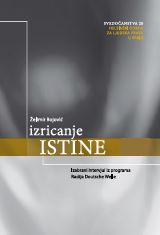
Interviews by Želimir Bojević, with: 1. Halilović, Alija 2. Stojanović, Gordana 3. Spasović, Grujica 4. Lučić , Zoran 5. Matić, Jovanka 6. Pavićević, Borka 7. Karamarković, Leposava 8. Stojadinović, Ljubodrag 9. Suša, Gordana 10. Nenadović, Aleksandar 11. Đorđević, Mirko 12. Mihajlov, Mihajlo 13. Barović, Nikola 14. Stojanović, Lazar 15. Matić, Veran 16. Duve, Freimut 17. Šaponja-Hadžić, Milanka 18. Čupić, Čedomir 19. Trkulja, Jovica 20. Đorđević, Snežana 21. Trebješanin, Žarko 22. Pavlović, Vukašin 23. Milivojević, Snježana
More...
Every Saturday for a period of two months, from the beginning of April till the end of June 1992, sessions organized by the Belgrade Circle were held at the Student Cultural Centre in Belgrade. At these sessions, ten in all, intellectuals, members of the Belgrade Circle and their quest – distinguished writers, scientists, artists, journalists, film and theatre directors, architects, actors, interpreters – expressed their own views of another, radically different Serbia. In times of anguish and affliction, the meetings, attended by a large assembly of listeners experiencing a kind of moral purification, were nonetheless imbued with a frail hope that there still might be a chance for a turn in events. With a desire to present ideas, opinions and sensations shared by the participants of the Belgrade Circle sessions to a much larger audience, the reading public, and to preserve them, because of their merit, in a more lasting form, discussions of over eighty intellectuals were compiled to form this book. In the meantime, the overwhelming disaster has reached its climax: »The Bosnian War«, still raging with no feasible way out as yet, exploded and blazed up like fire. The Belgrade Circle participants, distressed and abashed at the display of all those real or imagined evil deeds, so eagerly reported by the portentous heralds of death voiced hitherto often deeply hidden and silent feelings and thoughts about their burdensome disgust at the plague gripping and afflicting us all. Each participant contributed in his or her own way – rigorous scientific analysis, artistic susceptibility, eyewitness accounts, or simply. A public-minded desperate wail – to the shaping of one new, public opinion, the one that stirred in that sad Spring of ’92 and rebelled against the general fear, animosity, devastation, extermination, ethnic cleansing, forcible population exchanges... All those responsible and public-minded citizens, holding different political opinions, some members of various political parties, with incomparable personal experiences, varied professional interest and often of »objectionable« national origin, showed, however the will to insert tolerance among the basic principles of a humanized way of fife. But, in spite of the pronounced differences, their common aim, discernable in each and every speech imported to the audience, was to finally establish a community based on simple but as yet still unattainable ideals such as peace, freedom, tolerance and justice in place of degrading political, national and religious exclusiveness. Participants focussed their attention on various aspects of the problem: some analysed the roots of hatred and evil; some indicated the disastrous consequences of irresponsible national myth revivals; others warned of menaces yet to come unless we see reason in time. Some were stern, others witty and others still perhaps too prone to pathos, but they were all deeply concerned, and, as it unfortunately turned out, correct in predicting subsequent events. Therefore, individuals who take no notice of current, official policy and who have for a long time now tenaciously refused to render their talent and knowledge to the needs of the authorities, gathered round a project titled »Another Serbia«. Instigating a state of war and providing alleged erudite justification for the necessity of mutual extermination in the name of some noble goals, vague even to the very massacre executors, must not and cannot be the vocation of anyone who considers him or herself an »intellectual«, or earns a living acting as one. Hence, all session participants had but one desire: to mark out a path that may lead into a more promising future, to another, different, better and happier Serbia. »Another Serbia« soon became the synonym of resistance to fabricated lies, nationalistic madness, criminal war, a fascist holocaust, senseless destruction of villages and cities. Thanks are also due to the daily newspaper »Borba« which regularly reported on the Belgrade Circle Saturday sessions, and published a number of contributions presented there... We hope that the Another Serbia we all aspire to be easily discernable in the collection of essays presented in this book. The reader who hopes to find traces of at least some political program will be gravely disappointed. At present, when politics have poisoned the very soul of so many men of letters and knowledge, and when, among the most violent oppressors, in the ranks of all mortal enemy groups, one finds so many proud bearers of scientific degrees, who may actually be designated as men of unmerited and easily squandered reputation, it has become somewhat indecent to praise »intellectual pursuits«. The Belgrade Circle was, however, founded early in 1992 with the aim of retrieving dignity – another dangerous quality! – to public speech and conceived plans of action for the benefit of truth. We do not take an elitist position and stand indifferently above the crowd. On the contrary, being deeply involved and concerned, we place ourselves in its midst. The Association of Independent intellectuals insists upon its main goal, as declared in the program, namely, to bring together »critically oriented public figured who wish to unite their own civil and intellectual engagements with those of other, basically similarly oriented people«. That is why the Belgrade Circle will continue to »promote ideas, deeds and activities that affirm the values of a democratic, civil and plural society...« The Belgrade Circle will »encourage free and critical thought in all spheres of public life. It will support and help institutions and individuals who resist violence and animosity, and who plead for dialogue and for the survival of culture as the only humanly valid way of life«. Fine speeches? Maybe. Nevertheless, the Belgrade Circle has already, and despite many organizational and financial hardships, as well as ugly and unjust abuse from people who should have been, by the very nature of their vocation, in our ranks had they not knuckled under the burden of a more noble – national to be sure – mission, gained an undeniably high reputation. The words uttered with the aim of promoting »Another Serbia« and presented in this book to serve at testimony to the existence of a number of sensible people, shrewd and brave enough to resist suffocation by overwhelming absurdity, were not the only »weapon« used by Belgrade Circle members. They had also an active part in numerous civil and peace movements and events, thus contributing to the establishment of critical public opinion in Belgrade and Serbia: let us recall, for instance, the sad candles and our wake in the park, with souls colder than the Belgrade frost, while one of the past infernal wars – God, which one was it? – was raging out there somewhere; let us recall the »Black Band«, »Yellow Band«, »Student Protest ‘92«, and our endeavours to bring the people of Hrtkovci (»Srbislavci«) to reason; let us recall our guests from Pljevlja, Montenegro, Bosnia... All the time we were just launching our unhappy and, we believe, noble, though perhaps futile venture the very first participant said: let the Belgrade Circle begin it’s work! We hope that by offering this book to the public we have already come a long way.
More...
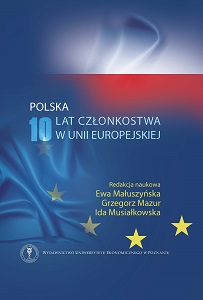
Celem artykułu jest próba oceny znaczenia uczestnictwa Polski w jednolitym rynku europejskim dla wybranych uwarunkowań mobilności edukacyjnej i zawodowej młodych Polaków. Zasadniczą tezą jest natomiast stwierdzenie, że udział Polski we wspólnotowych programach edukacyjnych zwiększa szanse młodych ludzi na rynku pracy.
More...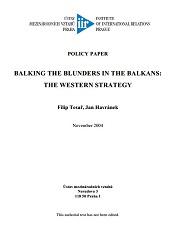
Since the beginning of the 1990s, the West was obliged to deal with several crises in the Balkans and pledged to a complete reconstruction of the post-war situation in the region. During this demanding process, the Western countries however maximised their traditional stereotyped attitudes towards the Balkan countries. Both the European Union and the United States have typecast the Balkan states according to the extent of the internal problems of these states, and according to their own ability to deal with such issues. Despite the good intentions behind the acting of the West, this process resulted in a mixture of shambolic strategies that have made the Western presence in the region very complicated. The West has been gradually loosing its military and managing respect, given its reluctance to pursue the proclaimed objectives. Such disinclination to act has played into the hands of the local bosses, who very soon found out how the system can be abused in order to satisfy both their electorate and the Western custodians. Nowadays, it is clear that such a hesitant attitude of the West towards the Balkans is no longer sustainable. A significant change in the Western strategy towards the Balkan countries is required, should the integration of the Balkans into the Western structures (i.e. NATO, EU) be successful.
More...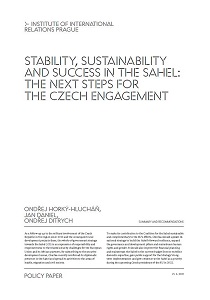
As a follow-up up to the military involvement of the Czech Republic in the region since 2013 and the consequent rural development projects there, the whole-of-government strategy towards the Sahel (G5) is an expression of responsibility and responsiveness to the related security challenges for the European Union and its African partners. By subscribing to the security-development nexus, Czechia recently reinforced its diplomatic presence in the Sahel and spread its activities to the areas of health, migration and civil society. To make its contribution to the Coalition for the Sahel sustainable and complementary to the EU’s efforts, Czechia should update its national strategy to build the Sahel’s forward resilience, expand the governance and development pillars and mainstream human rights and gender. It should also improve the financial planning and mainstream the Sahel in the current budget lines to mobilise domestic expertise, gain public support for the Strategy’s long-term implementation and give credence to the Sahel as a priority during the upcoming Czech presidency of the EU in 2022.
More...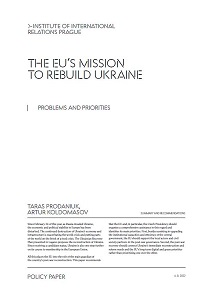
Since February 24 of this year, as Russia invaded Ukraine, the economic and political stability in Europe has been disturbed. The continued destruction of Ukraineʼs economy and infrastructure is exacerbating the world crisis and putting parts of the world on the brink of a food crisis. The Ukrainian Recovery Plan presented in Lugano proposes the reconstruction of Ukraine. Since receiving a candidate status, Ukraine is also one step further on its course to membership in the European Union. All this places the EU into the role of the main guardian of the countryʼs post-war reconstruction. This paper recommendsthat the EU and, in particular, the Czech Presidency should organize a comprehensive assistance in this regard and identifies its main priorities. First, besides assisting in upgrading the institutional capacities and efficiency of the central government, the EU should support the local actors and civil society partners in the post-war governance. Second, the post-war recovery should connect Ukraineʼs immediate reconstruction and reform needs and the EUʼs long-term digital and green priorities rather than prioritizing one over the other.
More...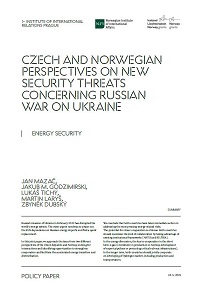
Russia’s invasion of Ukraine in February 2022 has disrupted the world’s energy system. The most urgent need was to phase out the EU’s dependence on Russian energy imports and find a quick replacement. In this joint paper, we approach the issue from two different perspectives of the Czech Republic and Norway, looking for intersections and identifying opportunities to strengthen cooperation and facilitate the accelerated energy transition and diversification. We conclude that both countries have taken immediate action in addressing the most pressing energy-related risks. The potential for closer cooperation is obvious. Both countries should maximise the level of collaboration by taking advantage of existing institutional frameworks (NATO and EU/EEA). In the energy dimension, the key to cooperation in the short term is gas (investment in production in Norway, development of export pipelines or protecting critical sub-sea infrastructure). In the longer term, both countries should jointly cooperate on developing of hydrogen market, including production and transportation.
More...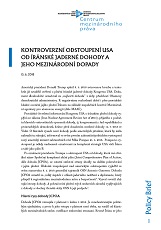
On May 8, 2018, US President Donald Trump went through with his threat and, this time, has not submitted his certification of the implementation of the Iranian nuclear agreement to the US Congress for approval. According to Trump, the document is the “worst deal” of Obama Democratic administration. He made his negative decision despite Iranʼs positive performance in the inspections by the International Atomic Energy Agency (IAEA).
More...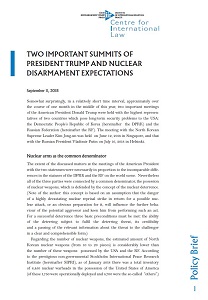
Somewhat surprisingly, in a relatively short time interval, approximately over the course of one month in the middle of this year, two important meetings of the American President Donald Trump were held with the highest representatives of two countries which pose long-term security problems to the USA: the Democratic People’s Republic of Korea (hereinafter the DPRK) and the Russian Federation (hereinafter the RF). The meeting with the North Korean Supreme Leader Kim Jong-un was held on June 12, 2018 in Singapore, and that with the Russian President Vladimir Putin on July 16, 2018 in Helsinki.
More...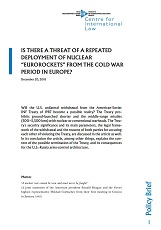
Will the U.S. unilateral withdrawal from the American-Soviet INF Treaty of 1987 become a possible reality? The Treaty prohibits ground-launched shorter and the middle-range missiles (500–5,500 kms) with nuclear or conventional warheads. The Treaty´s security significance and its main parameters, the legal framework of the withdrawal and the reasons of both parties for accusing each other of violating the Treaty, are discussed in the article as well. In its conclusion the article, among other things, explains the context of the possible termination of the Treaty, and its consequences for the U.S.-Russia arms-control architecture.
More...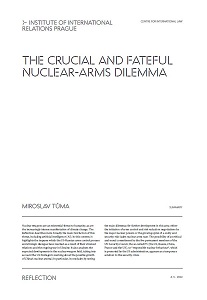
Nuclear weapons are an existential threat to humanity, as are the increasingly intense manifestation of climate change. The Reflection describes more broadly the main risk factors of this threat, including artificial intelligence (AI). In this context, it highlights the impasse which the US-Russian arms control process and strategic dialogue have reached as a result of their strained relations and the ongoing war in Ukraine. It also analyses the expected developments in the nuclear weapon field, taking into account the US Pentagon’s warning about the possible growth of China’s nuclear arsenal. In particular, it concludes by noting the main dilemmas for further development in this area: either the initiation of arms control and risk reduction negotiations by the major nuclear powers or the growing spiral of a costly and security-risk-laden nuclear arms race. The possibility of an ethical and moral commitment by the five permanent members of the UN Security Council, the so-called P5 (the US, Russia, China, France and the UK), to “responsible nuclear behaviour“, which is promoted by the US administration, appears as a temporary solution to this security crisis.
More...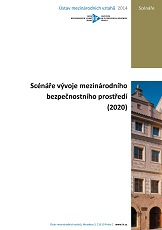
The document discusses the complexity of the global security environment and the emergence of hyper-risks due to interconnected anthropogenic systems. It suggests increasing resilience against hyper-risks by dividing existing systems into smaller units and creating circuit breakers to prevent cascading global reactions. The publication explores creative thinking about the future without precise probabilistic predictions, acknowledging the sudden and unexpected nature of significant events in complex systems, famously termed "black swans" by Nassim Taleb. It also examines geopolitical risks, the relative decline of US power, and the potential for a G-zero World scenario. The project's methodology is based on the complexity of the security environment, rejecting precise probabilistic forecasts and instead offering internally consistent hypotheses about future developments to aid in strategic thinking.
More...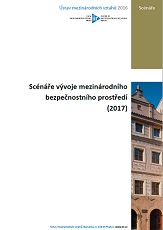
Držíte v rukou závěrečnou studii vznikající v rámci projektu TA ČR Scénáře mezinárodního bezpečnostního prostředí. Uzavírá se jí tříletý cyklus kolektivních spekulací týmu soustředěného v Ústavu mezinárodních vztahů o možnostech vývoje tohoto prostředí. Projekce, které vznikly jako výstupy těchto spekulací, nemají ambici být přesnými předpověďmi. Vysoká komplexita mezinárodního bezpečnostního prostředí jako systému, kde dochází k dynamické interakci množství předem daných skutečností, hybných sil a kritických neznámých, možnost takové předpovědi téměř vylučuje. Naše scénáře sledují jiný cíl: kombinací prediktivního (jaká budoucnost bude) a explorativního (jaká budoucnost může být) přístupu a záměrnou vícečetností podobně pravděpodobných projekcí vývoje v každém sektoru bezpečnostního prostředí být nástroji tvořivého promýšlení možných budoucností, rozšiřování horizontu úvah o tom, jak přispět k naplňování jejich z hlediska české zahraniční politiky nejvýhodnějších variant a zkoušení zažitých předpokladů o tom, co bezpečnostním prostředím, ve kterém se Česká republika nachází, hýbe.
More...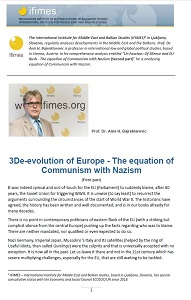
It was indeed cynical and out-of-touch for the EU (Parliament) to suddenly blame, after 80 years, the Soviet Union for triggering WWII. It is unwise (to say least) to resurrect the arguments surrounding the circumstances of the start of World War II. The historians have agreed, the history has been written and well documented, and is in our books already for many decades. There is no point in contemporary politicians of eastern flank of the EU (with a striking but complicit silence from the central Europe) pushing up the facts regarding who was to blame. There are neither mandated, nor qualified or even expected to do so.
More...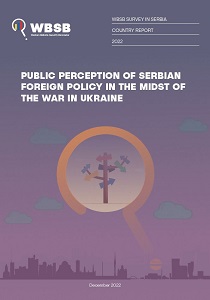
The war in Ukraine did not significantly affect the perception of the Serbian public regarding the major issues of Serbian foreign and security policy. In this context, this relates to how Serbian citizens think about the influence of great powers in their country and how the public perceives its relations with Russia and Western security institutions, the EU and NATO. The public opinion surveys also showed that the issue of Kosovo is still being perceived as a major foreign policy priority. There is a powerful cynicism in how the Serbian public views great power influences, as most respondents believe that external great powers bribe Serbian politicians and moguls to further their interests in the country. Russia and China are perceived as close foreign policy partners of Serbia, putting them in clear advantage over those who favour the EU on that front. The respondents also believed that Russia and China are sincere friends of Serbia and not players guided by their self-interest. As opposed to the study conducted by the Belgrade Centre for Security Policy (BCSP) in 2020, which noted that Serbs perceived Chinese influence in the country as more positive than Russian influence, the latest survey shows that those who believe Russian influence in Serbia is positive have a slight edge over those who believe the same about Chinese influence. This is most likely the result of the fact that China has not been in the spotlight in recent months.
More...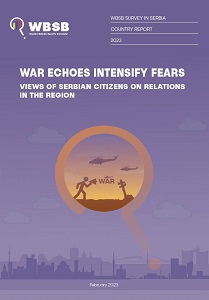
The Belgrade Centre for Security Policy conducted the annual public opinion survey on relations in the region, with a special focus on the Western Balkan countries and current events and trends. This report analyses Serbian citizens’ views on three main topics – the possibility of conflicts in the Balkans, Serbia’s bilateral relations with its neighbours, as well as key benefits and opportunities of regional cooperation and initiatives. Due to the current war in Ukraine and the war-mongering rhetoric in the Balkans, the fear of outbreak of conflict in the Balkans has risen. Compared to results from 2020, when more than half of citizens were not afraid of possible conflicts at all, the 2022 survey shows that almost two thirds of respondents are to a certain extent afraid of the outbreak of conflicts in the region in the next five years. Concerning potential causes of the conflict in the region, two-thirds of Serbian citizens believe that it is very or somewhat likely that a conflict might break out over the status of Kosovo. On the other hand, the results of the survey indicate a significant decrease in support of the reintroduction of mandatory military service, in comparison to results from 2020. When it comes to bilateral relations between Serbia and its neighbouring countries, the data shows a decline in support for potential separation of Republic of Srpska from Bosnia and Herzegovina and unification with Serbia. Citizens believe that relations between Serbia and Montenegro have not improved significantly, despite the signing of the Fundamental Agreement with the Serbian Orthodox Church. On the contrary, the negative perception of Serbian public towards Albania has slightly improved over the last two years, mainly due to the closer cooperation between the leaders of the two countries through the Open Balkan initiative. However, regional relations are still seen as strained, in part due to the promotion of the concept of Serbian world which creation is supported by slightly more than 40% of citizens. In 2022, the focus of the public in terms of regional cooperation was directed more directly to the Open Balkan initiative as a platform for collaboration between Albania, North Macedonia and Serbia. Although the data show an increase in the number of Serbian citizens who are familiar with the idea, there are still no concrete and publicly visible results of the initiative
More...